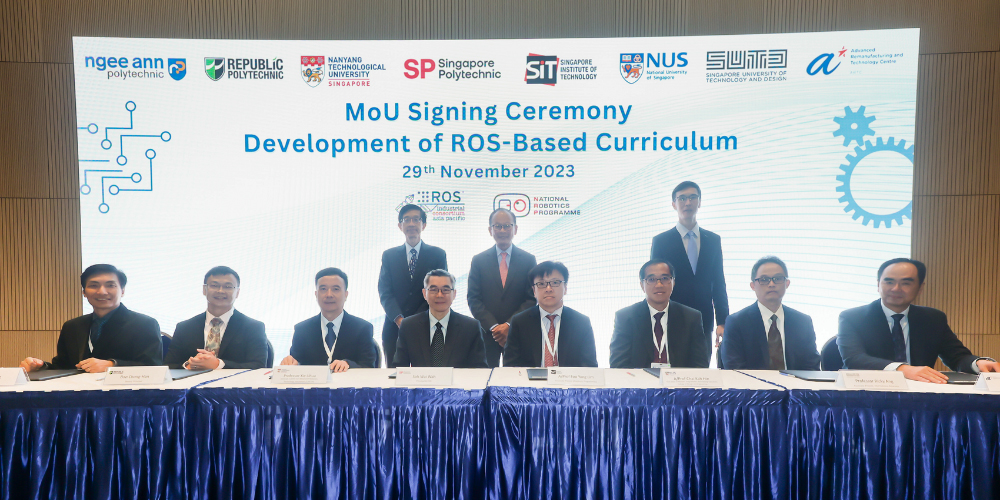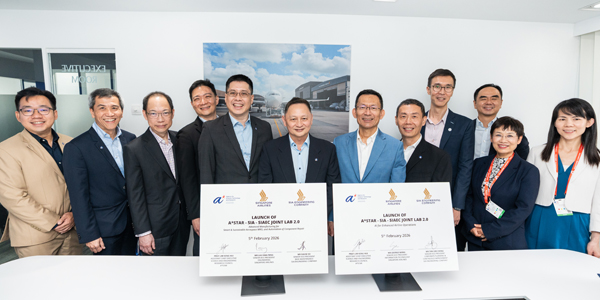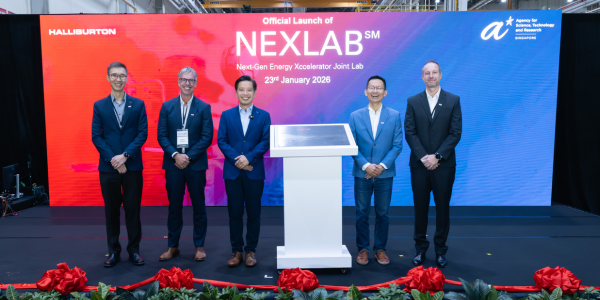A*STAR NEWS
A*STAR, Polytechnics And Universities Join Hands To Harmonise Students’ Learning Outcomes From Robotics Courses
SINGAPORE – The Agency for Science, Technology and Research (A*STAR) has joined hands with seven local Institutes of Higher Learning (IHLs), to ensure consistent learning outcomes for students taking robotics courses, equipping them with similar knowledge and skills that can be used for robotics work when they enter the workforce. The parties signed a Memorandum of Understanding (MoU) during a ceremony at the ROS-Industrial Consortium Asia Pacific Annual Summit on 29 November 2023. National Robotics Programme’s chief executive Professor Quek Tong Boon witnessed the signing.

(L to R) Mr Mah Wee Beng, Deputy Principal, Ngee Ann Polytechnic; Mr Boo Chong-Han, Deputy Principal (Academic & Organisational Development), Republic Polytechnic; Prof Xie Lihua, Director for Centre for Advanced Robotics Technology Innovation (CARTIN), Nanyang Technological University, Singapore; Professor Quek Tong Boon, Chief Executive, National Robotics Programme; Mr Soh Wai Wah, Principal & CEO at Singapore Polytechnic; Mr Peter Tan, Co-Chairman, ARTC, A*STAR; Associate Professor Foo Yong Lim, Associate Provost (Academic Programmes), Singapore Institute of Technology; Associate Professor Chai Kah Hin, Vice Dean of Masters’ Programme and Lifelong Education, College of Design & Engineering, National University of Singapore; Prof Lim Keng Hui, Assistant Chief Executive, Science and Engineering Research Council, A*STAR; Professor Ricky Ang, Associate Provost (International Relations), Singapore University of Technology and Design; and Dr David Low, CEO of ARTC, A*STAR at the MoU signing ceremony on 29 November 2023.
In response to Singapore’s vibrant and growing robotics ecosystem 1 , the MoU will focus on harmonising students’ learning outcomes and improving their competence related to the Robot Operating System (ROS), an open-source framework designed to develop and control robots. ROS is increasingly used in the industrial applications of robotics, as it allows robots from different manufacturers and with different user interfaces to communicate in a common language. Such efforts will contribute to bolstering the relevance and competitiveness of our future workforce, as well as empower our workforce to take on higher-value tasks.
The ROS-Industrial Consortium Asia Pacific (ROS-I AP), managed by A*STAR’s Advanced Remanufacturing and Technology Centre (ARTC), will lead the collaboration with Nanyang Technological University, Singapore (NTU Singapore), National University of Singapore (NUS), Ngee Ann Polytechnic (NP), Republic Polytechnic (RP), Singapore Institute of Technology (SIT), Singapore Polytechnic (SP), and Singapore University of Technology and Design (SUTD).
As the Asia Pacific representative, ROS-I AP has been actively adapting the capabilities of ROS to relevant hardware, to better suit the needs of industrial applications in the region. In the past, robots are programmed via proprietary solutions, limiting the speed and possibilities of developing new innovations. Building on ROS’ open-source framework, ROS-I AP encourages the industry’s use of ROS by pooling resources and shared knowledge to catalyse ROS applications in manufacturing automation. ROS-I AP also conducts training and outreach, to ensure that the region’s talent pool is equipped to support the increasing application and deployment of robots.
Under this MoU, ROS-I AP will leverage its knowledge and expertise in the field of manufacturing technologies and applications, while the IHLs will contribute their experience of developing ROS-related course content for educational purposes. Collaboration areas include:
- Developing a standardised curriculum and structure for ROS-based courses, as IHLs are currently delivering ROS-related content to students to varying degrees. This includes planning how courses should be delivered and determining learning outcomes, to enhance the quality and effectiveness of educational content, as well as ensure students receive a consistent level of knowledge and skills related to ROS.
- Monitoring the effectiveness of the developed course content, by piloting course content in IHLs and assessing students to determine if they have achieved the desired learning outcomes. ROS-I AP and IHLs will develop an assessment framework to evaluate the competency of students.
- Updating course content to align with latest industry developments, ensuring that students acquire knowledge and skills that remain relevant to evolving industry landscape.
ROS-I AP and IHLs will focus on ensuring that students across IHLs will gain a consistent and acceptable level of ROS-related capabilities. This will establish a baseline competency that the industry can rely on, and increase employers’ confidence in the skills of graduates.
This MoU marks an initial phase of a larger Train-and-Place programme that ROS-I AP is driving, in view of growing industry demand in Singapore for robotics-related skills. This programme aims to train a pool of competent individuals who can be placed in companies to work on ROS-related projects.
1 https://www.nrp.gov.sg/industry/
- END -
ANNEX A – SPOKESPERSONS’ QUOTES FROM A*STAR AND IHLs
“As A*STAR embarks on this collaboration with the IHLs, we continue to drive the mission of ROS-I AP in advancing the industrial applications of ROS. ROS-I AP will contribute our knowledge, expertise and experience in the applications of robotics in manufacturing, to bridge the gap between academia and industry. A*STAR is excited to work with the polytechnics and universities, to support the upskilling of our future workforce and develop a strong talent pipeline, contributing to Singapore’s Manufacturing 2030 vision,” said Dr David Low, CEO of A*STAR’s Advanced Remanufacturing and Technology Centre (ARTC).
“With increasing digitalisation, many sectors are turning to automation to increase productivity and efficiency, highlighting the need for Singapore to develop a workforce that is skilled in robotics. NTU has been contributing to the growth of Singapore’s robotics ecosystem through the development of research solutions with real-world applications. Our collaboration with A*STAR and other Singapore IHLs will see NTU leverage its strengths in robotics research and its close ties with industry partners to ensure that the ROS-based (Robot Operating System) courses are developed in line with the latest industry needs, contributing to the training and upskilling of Singapore’s talents in the area of robotics,” said Prof Lam Khin Yong, Vice President (Industry), Nanyang Technological University, Singapore (NTU Singapore).
“Catalysing a paradigm shift, robots have seamlessly integrated into everyday life in Singapore, performing tasks such as sanitising spaces, providing culinary service, conducting urban surveillance, and contributing to automated industries. The College of Design and Engineering at the National University of Singapore (NUS) is honored to be one of the key participants in this collaboration. Our collaboration aims to propel the development of both education and practical applications in the field of robotics technology in Singapore,” said Professor Teo Kie Leong, Acting Dean, NUS College of Design and Engineering.
“As the deployment of robotics technology becomes more prevalent across diverse industries, the need for standardisation and interoperability is evident. Ngee Ann Polytechnic (NP) looks forward to partnering with A*STAR’s ARTC to co-develop a standardised course curriculum on ROS-based topics, and to collaborate on projects in the fields of robotics and automation. Through our joint efforts, we are confident that we can further enhance the quality of NP’s ROS-based courses, strengthen industry competencies, and foster an innovative robotics and automation ecosystem,” said Mr Mah Wee Beng, Deputy Principal, Ngee Ann Polytechnic.
“As companies embrace Industry 4.0 for the future economy, our collaboration with A*STAR’s ARTC will further spur technological innovation and knowledge exchange between academia and the industry. Students from the School of Engineering will learn about cutting-edge robotics and be exposed to real-life examples as part of their curriculum, preparing them to take on emerging professions in future growth sectors,” said Mr Boo Chong-Han, Deputy Principal (Academic & Organisational Development), Republic Polytechnic.
“This partnership marks a significant move for industries collaborating with IHLs, bolstering the active participation of IHLs in tackling the research and talent development challenges in Singapore's advanced manufacturing sector. As Singapore’s University of Applied Learning, SIT is dedicated to providing specialised, industry-focused programmes tailored to the specific needs of our local workforce and industries. Our close collaboration with industry partners ensures our students gain a comprehensive and hands-on learning experience,” said Associate Professor Gan Hiong Yap, Head of NAMIC Hub@SIT.
"In today's diverse industries, robotics play a vital role in enhancing efficiency, lowering labour costs, and driving Singapore's technological progress. The standardisation of Robot Operating System (ROS) course curriculum in IHLs is imperative to cultivating industry-ready robotics professionals with a strong ROS skillset customised for the evolving needs of Singapore’s industries. The partnership enables SP to produce graduates prepared to make meaningful contributions to the multifaceted transformations within the robotics ecosystem,” said Mr Soh Wai Wah, Principal & CEO at Singapore Polytechnic.
“This MoU will further strengthen the strong partnership that A*STAR’s ARTC has with SUTD in the areas of robotics and Robotics Operating Systems (ROS). It also reaffirms our commitment towards design education, product development and industry engagement in the emerging robotics sector. Our research team will bring its expertise in reconfigurable robotics to the table, focussing specifically on applications for use in the maintenance and manufacturing industries. As with all our work, we will work closely with industry to find effective solutions for effective roll-out, through design and technology,” said Professor Chong Tow Chong, President of the Singapore University of Technology and Design (SUTD).
ABOUT THE AGENCY FOR SCIENCE, TECHNOLOGY AND RESEARCH (A*STAR)
The Agency for Science, Technology and Research (A*STAR) is Singapore's lead public sector R&D agency. Through open innovation, we collaborate with our partners in both the public and private sectors to benefit the economy and society. As a Science and Technology Organisation, A*STAR bridges the gap between academia and industry. Our research creates economic growth and jobs for Singapore, and enhances lives by improving societal outcomes in healthcare, urban living, and sustainability. A*STAR plays a key role in nurturing scientific talent and leaders for the wider research community and industry. A*STAR’s R&D activities span biomedical sciences to physical sciences and engineering, with research entities primarily located in Biopolis and Fusionopolis.
Was This Article Helpful ?
A*STAR celebrates International Women's Day

From groundbreaking discoveries to cutting-edge research, our researchers are empowering the next generation of female science, technology, engineering and mathematics (STEM) leaders.
Get inspired by our #WomeninSTEM




